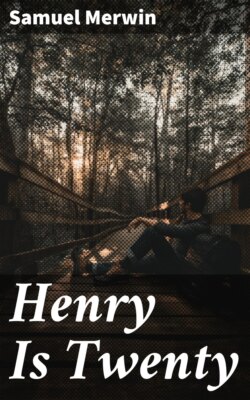Читать книгу Henry Is Twenty - Samuel Merwin - Страница 6
На сайте Литреса книга снята с продажи.
3
ОглавлениеTable of Contents
A little later—red about the ears, and given to sudden starts when the swinging pantry doors opened to let a student waiter in or out—he sat, quite erect, in the dining room and bolted a boarding-house breakfast of stewed prunes, oatmeal, fried steak, fried potatoes, fried mush swimming in brown sugar syrup, and coffee. The Discourses of Epictetus lay at his elbow.
After this he walked—stiffly self-conscious, book under arm—over to Simpson Street, and took a chair and an Inter Ocean at Schultz and Schwartz's, among the line of those waiting to be shaved.
This accomplished he paused outside, on the curb, to pencil this entry in a red pocket account-book:—
'Shave—10 c.'
He wavered when passing Donovan's; stepped in and consumed a frosted maple shake. Which necessitated the further entry in the red book:—
'Soda—10 c.'
In front of Berger's grocery he met Martha Caldwell. They walked together to the corner.
Martha was a sizable girl, about as tall as Henry, with large blue eyes, an attractively short nose, abundant brown hair coiled away under her flat straw hat, and a general air of good sense. Martha was really a goodlooking young woman, and would have been popular had not Henry stood in her light. She had a small gift at drawing (the Gibson copies in Henry's room were hers) and danced gracefully enough. Monday and Thursday evenings were his regular calling times; and there were so many other evenings when he was expected to take her to this house or that with 'the crowd' that the other local 'men' had long since given up calling at her house. But they were not engaged.
On this occasion there was constraint between them. They spoke of the lovely weather. She, knowing Henry pretty well, looked with some curiosity at his book. Henry glanced sidelong at her across a wide bottomless gulf, and stroked his moustache. He was groping desperately for words. He began to resent her. He presented an outer front of stem self-control.
At the corner they stopped and stood in a silence that grew rapidly embarrassing.
She lowered her eyes and dug with the point of her parasol in the turf by the stone walk.
He thrust both hands into his trousers' pockets, spread his feet, and stared across at the long veranda of the Sunbury House. It seemed to him that he had never been so unhappy.
'Are you'—Martha began; hesitated; went on—'were you thinking of coming around this evening?'
'Why—it's Thursday, ain't it?'
'Yes,' she said, 'it's Thursday.'
'Listen, Martha!' Was it possible that she suspected something? But how could she! His ears were getting red again. He knew it. She must never, never know about Mamie!... 'Listen, I may have to go down to Mrs Arthur V. Henderson's.'
'Oh,' she murmured, 'that musicale.'
'Yes.' Eagerness was creeping into his voice. 'Anne Mayer Stelton. She's been over studying with Marchesi, you know. Mrs Henderson asked specially to have me cover it.'
'Why don't you go?'
'Well—you see how it is. Of course, I'd hate——'
'You'd better go.' Saying which Martha turned away down Filbert Avenue, and left him standing there.
He bit his lip; pulled at his moustache. 'I ought to do something for her,' he thought. 'Buy some flowers—or a box of Devoe's.'
This was an idle thought; for the day, Thursday, lay much too close to the financially lean end of the week to permit of flowers or candy. And he hadn't asked anywhere for a dollar of credit these nearly two years. Still, he felt faintly the warmth of his kindly intention.
It didn't seem altogether right to let her go like that. They had not before drifted so near a quarrel. On the farther side of the street he paused, and glanced down the avenue.
A smart trap that he had never seen before had pulled up, midway of the block. An impeccable coachman sat stiffly upon an indubitable box. A man who appeared to have reddish hair, dressed in a brown cutaway suit and Derby hat, a man with a pronounced if close-cropped red moustache and a suggestively interesting band of mourning about his left sleeve, was leaning out, gracefully, graciously, talking to—Martha. And Martha was listening.
Henry moved on, little confused pangs of quite unreasonable jealousy stabbing at his heart, and entered the business-and-editorial office of The Weekly Voice of Sunbury, where he worked.
Here he laid down the Discourses of Epictetus and asked Humphrey Weaver, untitled editor of the paper (old man Boice, the owner, would never permit any one but himself to be known by that title), for the galley proofs of the week's 'Personal Mention.'
He found this item:—
Mr James B. Merchant, Jr., of Greggs, Merchant & Co., was a guest of Mr and Mrs Ames at the Country Club on Saturday evening. Mr Merchant has leased for the summer the apartment of M. B. Wills, on Lower Filbert Avenue.
That was the man! James B. Merchant was a bachelor, rich, a famous cotillion leader on the South Side, Chicago, an only son of the original James B. Merchant.
And Martha had gone to the Country Club Saturday with the Ameses. This curious tension between himself and Martha had then first bordered on the acute. Mr Ames disapproved of Henry; he felt that Martha shouldn't have gone. And now, of course, her lack of consideration for himself was leading her into new complications.
He sat moodily fingering the papers on the littered, ink-stained table that served him for a desk. He was disturbed, uncomfortable, but couldn't settle on what seemed a proper mental attitude. He was jealous; but he mustn't let his jealousy carry him to the point of taking a definite stand with Martha, because—well...
Life seemed very difficult.
